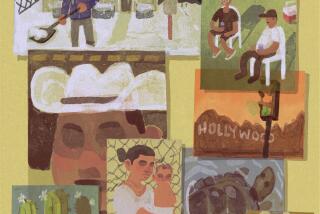Joshua Finds Way Off Street in Urban Corps
- Share via
A mural in the Gaslamp Quarter shows a smiling, freckle-faced boy standing with his parents. The painting was of a real 10-year-old, but the smile was painted on.
There was no steady home with a father or nurturing mother for Joshua Conrow, friends and relatives said. He was left alone to roam downtown’s streets.
Today, the 19-year-old said he’s getting the support he needs to live cleanly and finish high school. And he has learned that the support of others has to rest on a foundation of self-esteem and inner strength.
“If you believe in yourself, you can change,” Conrow said. “You have to say, ‘This is my life’ and can’t expect someone to hand it to you.”
Since October, Conrow has held down his first “real” job, relatives said. The San Diego Urban Corps has found him and a handful of other youths jobs at local museums. Doing maintenance work on the Maritime Museum ships has given him job skills and a second chance at building a solid future, he says.
Conrow, now studying to take the high school equivalency exam, said he was labeled a problem student early. It was a description he lived up to.
Though teachers tried counseling and drop-out prevention programs, Conrow said he blew it.
Switching schools every year as he and his mother moved around San Diego, Conrow began drinking and using drugs.
“I was a loser,” Conrow said.
Conrow tries to laugh when talking about seventh grade. That was when he moved away from his mother who “had a little (drug) habit of her own,” he said.
Conrow began working as a painter in exchange for rent and began missing more classes. When he was about to be sent to a foster home or honor farm, Conrow’s grandmother, Irene Buenrostro, took him. He was 13 years old.
“Josh was a child out in the adult world before his time,” Buenrostro said. “He lived in the street with no parents to guide him. He was like a little weed.”
By the time he was 15, he had the letters F-E-A-R tattooed between his knuckles.
“Instead of school, we’d go out in the park and drink beer . . . just sit around and talk,” Conrow recalled. “It was fun at times, boring at times. But it wasn’t nothing. It gives me nothing.”
Today, Conrow still wears a flannel shirt over a T-shirt, just as Conrow’s counselor at Memorial Junior High, Margaret Kleinsmith, remembers. He was full of anger then, Kleinsmith said.
Conrow said he sees the same people hanging out downtown that he saw when roaming the streets as a young boy. As he got older, he said, he realized that he wanted a different life than what he had seen.
As Conrow took a break from his work on the ship, he lit a cigarette. After kicking drugs and alcohol, smoking is one vice he might not give up, he said. Holding the smoke in his left fingers, his tattoo showed. He said the letters are going to be removed someday.
“This is it, this is my chance,” Conrow said of the corps job. He says he looks forward to learning a trade, perhaps in carpentry or drafting. The work in the museum program teaches more than a trade, he said. It teaches a work ethic of how to get up in the morning and try to do a good job.
A school education is important too, Conrow said.
“For little kids who think school’s a joke, (when they grow up) they’re going to realize they messed up,” Conrow said. “You have to be willing to take the first step to change. . . . and the fourth, fifth and sixth step too. It’s your life to lead.”
More to Read
Sign up for Essential California
The most important California stories and recommendations in your inbox every morning.
You may occasionally receive promotional content from the Los Angeles Times.













